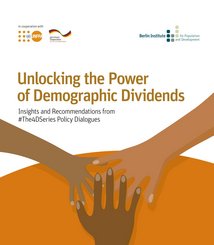
This report highlights the potential of targeted population policies to achieve demographic dividends.
Read more
Africa lags behind the rest of the world in the vast majority of development indicators. The continent urgently needs more of its own ideas, its own research and its own companies for social and economic development. Socio-economic development around the world has largely resulted from progress in three key areas requiring particular attention: health, education and agriculture. The study presents examples of how governments, NGOs, social enterprises and companies in Africa are already engaging with initiatives to tackle poverty, create jobs and counteract high population growth. “Leapfrogging” describes innovations that improve people's lives while skipping inefficient, costly and environmentally-harmful transitional stages of development. Examples include health facilities providing basic medical care in remote areas, online learning programmes which have become even more important since the beginning of the Covid-19 pandemic and cheap micro-insurance covering smallholder farmers in case of weather-induced crop failures.
The Berlin Institute would like to thank the Bayer AG for financial support. Research was carried out at the Stellenbosch Institute for Advanced Study (STIAS) in Stellenbosch, South Africa.
Freelance research associate
© Berlin-Institut
Executive Director
Telefon: +49 30 - 22 32 48 45
Contact via Mail: hinz@berlin-institut.org
© Berlin-Institut
Demographic change is not a disaster, but a challenge. Analyses and concepts are needed to master them successfully. The Berlin Institute for Population and Development provides these free of charge and makes a significant contribution to ensuring that important future issues are discussed on a broad basis and put on the political agenda. The non-profit Berlin Institute works on a non-partisan basis and receives no state funding whatsoever. Your donation therefore helps to maintain our independence and the high standard of our publications. Donations to the Berlin Institute are tax-deductible and can be made directly online using the donation button or by using a bank transfer form to the following account
Donation account
GLS Bank
IBAN DE15 4306 0967 1276 4833 00
BIC/SWIFT GENODEM1GLS
We thank you very much for your support!